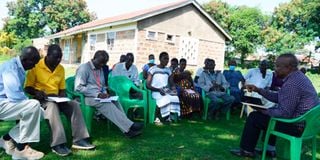Support groups helping erase HIV/Aids stigma in Homa Bay

Justus Ochola (right), HIV/Aids and STIs coordinator in Homa Bay County, speaks to members of Ikdilania, a community-based organisation of people living with HIV at Kajira, West Karachuonyo.
What you need to know:
- For decades, HIV stigma and discrimination have continued to have a negative impact on infected and affected individuals.
- The stigma often weakens the prevention of the spread of the viral disease, with many still afraid of seeking relevant information and services or revealing their status to their partners.
When John Abade learnt of his HIV status in 2005 after suffering bouts of illness, he chose to keep it a secret from his wife and friends for fear of being divorced and stigmatised.
For three years, he was in denial and even failed to start medication. This saw opportunistic infections take a toll on his health.
“In 2008, I had become weak and had to be rushed to the nearest health facility. That’s when I revealed my status to those close to me even though it cost me some friends,” says John.
It took time for his family and friends to come to terms with his status. To them, he was a dying man. This left him devastated. He would lock himself in his house even a for week. Eventually, he slid into depression.
Fearing that he could lose his life, he joined a support group with the hope that he would beat stigma, which was his greatest challenge.
“The group members who are HIV positive engaged me and offered me guidance and counselling, encouraging me not to allow the disease to take charge of my life,” he says.
George Otieno, another member of the group, shared his struggles of having to stop going to a local hospital and moving to a facility in a different county, where he was not known, because of the stigma that surrounded the disease then.
“I would travel more than 30 kilometres to a dispensary where no one knew me to take my ARVs. At times I would lack bus fare and go without the drugs for days,” he says.
While patients are required to take the drugs as prescribed for adherence, this was never the case for George, 50.
When he decided to come out publicly about his status in 2006, he was excluded from family meetings, group committees and was never allowed to share utensils or seats with those around him.
According to George, being part of the support group has now made him believe in himself. He has also overcome the fear of visiting the nearest hospital for care and treatment.
“For the last 16 years, I have been comfortably taking my drugs at Pala health center without any fear,” he says, adding that “all the group members are brave and that is why we are able to reveal our status to anyone without fear of stigma.”
The members often visit social places including markets, hospitals, churches and recreational centers to create awareness of the viral disease.
“We can only reduce the infections by knowing our status even as those who are infected continue taking their drugs,” says George.
“The group was formed with an aim to reduce HIV stigma. We realised more people were dying not because they had been overpowered by the disease but due to stigma, which was preventing many patients from accessing medical care,” said Karachuonyo Sub-county Aids Co-ordinator Joseph Onduu.
Stigma, which is a major barrier in the fight against HIV/Aids, is now a thing of the past to most patients in Homa Bay County, thanks to the support groups.
For decades, HIV stigma and discrimination have continued to have a negative impact on infected and affected individuals.
The stigma often weakens the prevention of the spread of the viral disease, with many still afraid of seeking relevant information and services or revealing their status to their partners.
This, however, is not the case in Homa Bay, which alongside Kisumu, Busia, Migori and Siaya are the counties with the highest HIV prevalence.
The county has 126,000 infected persons and a HIV prevalence of 18.2 per cent. According to the County Aids and STIs Coordinator Justus Ocholla, 95 per cent of people living with HIV have been successfully placed in care and treatment in various hospitals across the county.
“We have more than 96,000 people enrolled for ARVs in public hospitals while another 30,000 get services in private facilities, bringing the number to 126,000,” says Justus.
According to Justus, Homa Bay has recorded 4,000 new HIV cases in the last three months from 100,000 samples. Some 3,500 are on drugs while 500 are yet to start their medication.
He notes that support groups across the sub-counties have improved HIV care adherence and outcomes.
“Stigma no longer affects us in any way, we have made peace with the virus and ourselves and it is our wish that every single person accepts their status,” says John Abade Opudo, who has lived with the virus for 17 years.
In Karachuonyo sub-county, Ikidilania is one out of the more than five support groups raising awareness and speaking out against stigma. The community uses the support groups to spearhead awareness campaigns in a move aimed at reducing the number of ARV defaulters.
The initiative is also aimed at increasing HIV/Aids voluntary testing among locals, especially youths, who form the highest percentage of the new infections.




